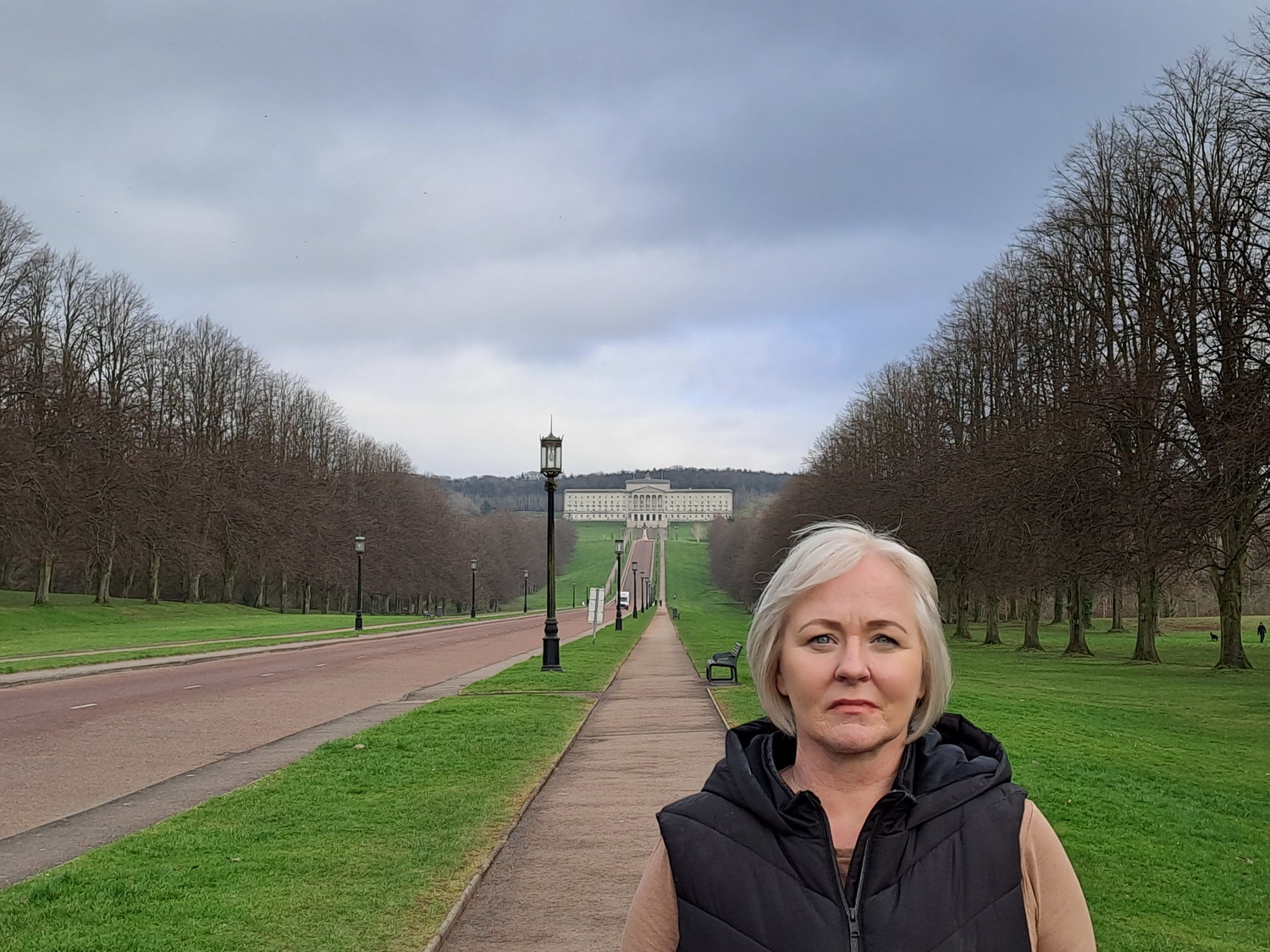
Deirdre Owens' partner John Fennell was killed in an INLA feud in 1996. Photo by Claire Simpson, The Detail
MORE than a third of people whose cases have been heard by a Troubles payment board have been turned down.
The Detail can reveal that of the 348 cases so far decided on by the Victims’ Payment Board (VPB), 123 have been deemed ineligible.
The remaining 225 people have been awarded payments.
The board was set up in August 2021, following a lengthy campaign by victims and survivors for redress for their injuries.
Deirdre Owens (53), whose partner was murdered in an INLA feud in 1996, is among those whose applications have been turned down.
Her fiancé John Fennell (40), a founder and leading member of the INLA, was beaten to death with breeze blocks in Bundoran, Co Donegal, in March 1996.
Their twin boys were less than a year old.
Ms Owens has been in receipt of personal independence payments (PIP) after she was diagnosed with post traumatic stress disorder several years ago.
She said she was left traumatised by the sight of her fiancé’s maimed corpse, received several death threats in the aftermath of the killing and was present in a friend’s house when a breeze block was thrown through the window.
However, the VPB has turned down her application for a payment, citing several reasons including that no report of death threats had been made to police.
Ms Owens said she was told repeatedly that “an individual wanted me dead” after she spoke out against her partner’s murder but could never report those threats to the RUC.
The 53-year-old, who is from west Belfast but was living in Ardoyne in the north of the city at the time of the killing, said she was again told her life was at risk after she was falsely accused of being one of several anonymous INLA members who appeared in an RTÉ documentary.
“I was never a member of the INLA,” she said.
She added: “When John’s body was in the house, a car drove up and a load of guys got out and started dancing in the street. Then there were the phone calls.
“I was over in Margaret Torney’s house (wife of INLA leader Hugh Torney killed in September 1996). We were sitting chatting with John’s sisters, and a car drove up and threw a breeze block through the window.”
Ms Owens said it would have been unthinkable in a republican area to contact the RUC about threats or attacks.
“You could get shot for bringing police into the district,” she said.
She added: “I took those threats very seriously because they (INLA members) shot dead a nine-year-old child (Barbara McAlorum in north Belfast in March 1996).
“They also shot dead John’s son (Francis Shannon in June 1996). And they shot dead Mary McGlinchey (wife of INLA leader Dominic McGlinchey in January 1987) as she was bathing her two boys. Of course I’m going to take that seriously.”
She said when Mr Fennell’s body was brought back to Belfast, it “hadn’t been prepared for viewing”.
“I realised when we opened it (the coffin) why it wasn’t meant to be opened,” she said
“They’d used concrete blocks on his head.”
The VPB turned down her request for payment because “given the circumstances of his death it is probable that forensic pathologists, morticians and/or undertakers had prepared the body in advance of it entering the coffin”.
The board also found that police had no record of any death threats.
“In the absence of compelling and corroborating evidence, the panel is not satisfied that the applicant has discharged the evidential burden in proving that any of the reported incidents could be considered as a Troubles-related incident,” the board’s report stated.
However, Ms Owens said the threats were clearly linked to the bitter INLA feud in the mid-1990s which claimed the lives of several people.
Ms Owens said that, prior to Mr Fennell’s death, RUC officers visited her at home to warn her his life was “in danger and he should step up his security”.
“But when he got his solicitor to check that out they denied they were ever in the house," she said.
Ms Owens said she went for counselling after Mr Fennell’s death.
But she said the counselling team could not provide evidence that she had sought help because it would breach general data protection regulation (GDPR) regulations.
“They’re only expected to keep notes for seven years anyway but GDPR allows nothing to be released,” she said.
Ms Owens has appealed the decision. Her appeal will be held on February 27.
Troubles Permanent Disablement Payment Scheme
The long-awaited Troubles Permanent Disablement Payment Scheme was launched in August 2021, following a battle by campaigners.
The scheme provides payments to people who the Victims’ Payment Board finds have been permanently physically or psychologically disabled as a result of the Troubles.
The board has so far received 3,825 applications for payment.
More than 550 applications have been listed for consideration by the board. Decisions have been made in 348 cases.
The scheme will remain open until August 2026.
Ms Owens said she understood the scheme was not intended for people who had been bereaved.
But she said she was a direct victim of the Troubles.
“I’ve always been acknowledged by the VSS (Victims’ Support Service) as a victim of the conflict, as have my sons,” she said.
Psychological injuries
Alan McBride, from WAVE Trauma Centre, has campaigned for victims of the Troubles for decades after his wife Sharon (29) was killed in the IRA’s 1993 Shankill bombing.
He was one of the leading campaigners who pushed for a payment scheme for victims.
Mr McBride said he felt the scheme was working relatively well.
“If the evidence is there to back up a claim then absolutely that claim will be progressed and the person will come out with an award ranging from anywhere between 14% and 100% depending on the nature of the injury, that includes psychological as well as physical,” he said.
But he acknowledged that it is easier to provide evidence of a physical injury.
“The reality is that people with psychological injuries have so much more to prove,” he said.
“They need psychologists’ reports or they need psychiatric reports, they need a GP’s letter."
He added: “That’s why the scheme is taking so long. People are taking over a year to process some of the claims. The reason for that is the VPB (Victims’ Payment Board) and Capita (the company helping to process applications) are searching for some of that evidence.”
Mr McBride said people whose legitimate applications have been refused should appeal.
“I do think there are people who have benefited but sadly there are many others that have been knocked back,” he said.
“Anybody that thinks they have a legitimate claim that has been knocked back should absolutely appeal.”

Deirdre Owens is to request a new inquest in the Republic into her partner's death. Photo by Claire Simpson, The Detail
INLA feud
Ms Owens said her partner was killed during a bitter INLA feud in the mid-1990s which claimed the lives of several people.
“John was a founder and leading member of the INLA and he had gotten caught up in a feud due to a de facto ceasefire (in 1995) being called,” she said.
Ms Owens said her partner was in favour of a ceasefire but others within the INLA were not.
She said the internal dispute escalated rapidly following the murder of INLA chief of staff Gino Gallagher in January 1996.
“I was completely unaware of what was actually happening because I was more involved in working full-time. The boys were only nine months old then,” she said.
Ms Owens said she believed that Mr Fennell was killed by people linked to the security forces.
“The car carrying the people (who allegedly were involved in Mr Fennell’s murder) came from Belfast,” she said.
Several people were arrested and questioned about the murder but no one has ever been charged.
The Police Ombudsman has said it will investigate alleged collusion around Mr Fennell’s murder.
But it has not set a date for the probe, due to the high number of cases it has to investigate.
Ms Owens’ sons Fionntan and Ruaidhri Owens-Fennell are taking a civil case against police over failings in connection with Mr Fennell’s death.
She will also be requesting a new inquest into Mr Fennell’s murder.
An inquest was held in the Republic of Ireland in October 1996 but Ms Owens said it was insufficient.
“I had to contact the gardaí. It took me 20-odd years to get the coroner’s report,” she said.
Ms Owens said the British government's controversial Legacy Bill, which will see an end to civil cases and many planned inquests, had come as a blow to victims’ rights, 25 years on from the Good Friday Agreement.
“For victims and survivors, where does that leave any of us?” she said.
“That is the frustrating and hurtful part. Are we all just going to be stuck?”
 By
By

